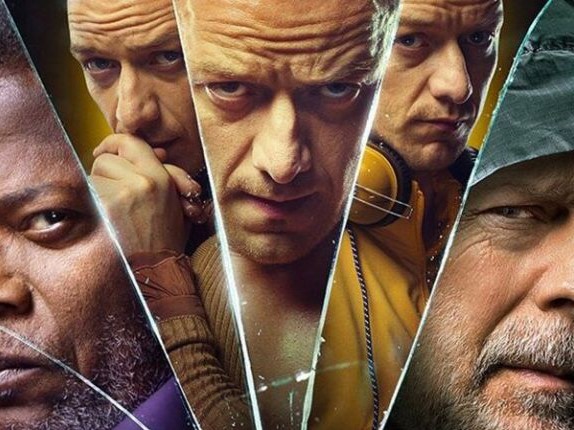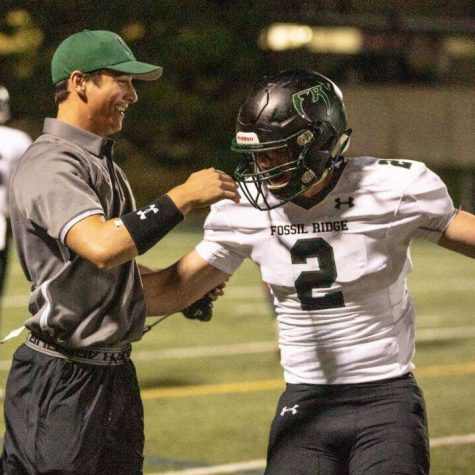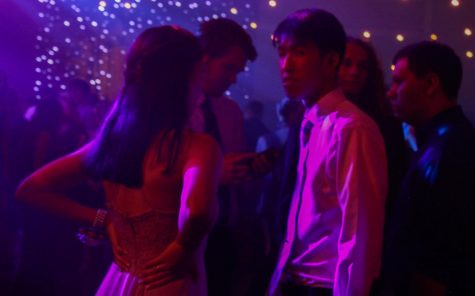Movie Review: Glass

Elijah (left), Kevin and a few key personalities (center), and David (right) are shown in fragments of glass.
January 22, 2019
Bringing a trilogy conclusion 19 years in the making, Glass has brought a worthy sequel to the box office. It fit in well with the tone and overall feel of its previous films, and brought in unique, unexplored ideas to turn the tide at the very end. However, nothing truly stuck out about this movie, and it was not something I feel the need to see again.
Glass broke into theaters January 18 as the final movie in the Eastrail 177 trilogy. Two previous films, Unbreakable and Split, did not have any crossover between each other, and Glass brings the two together well. I would not recommend seeing Glass without seeing its prequels, as the film would be extremely confusing without knowledge of the previous two. Unbreakable, released in 2000, follows two of the three main characters. It introduces audiences to Elijah Price, known as “Mr. Glass,” a comic-loving genius who suffers from a brittle bone disease. It also introduces David Dunn, who contrasts Elijah, as he is considered “unbreakable” after being the only survivor on a deadly train crash. Split followed the film 17 years later, and was later revealed as the sequel to Unbreakable. It features Kevin Wendell Crumb, a man with dissociative identity disorder, containing 24 different personalities.
The film brings Elijah, David, and Kevin together in a mental hospital, all having to face a doctor trying to convince them that they are not supernatural beings. For the most part, the plot was exceptional. It was well-paced, interesting, and brought new insight to the motifs behind the three main characters. Although the pacing of the film was slower than I expected, containing less action, it progressed and flowed well together. The film showed several days in the hospital, and showed the progression of time well. Even in all of the routine, Glass was never boring, holding my attention all the way through.
In Glass, the plot reveals took an already quality plot and made it better. Directors took everything expected to happen and went in a completely different direction than could ever be imagined. With Unbreakable, Split, and Glass all being directed by M. Night Shyamalan, the films have all have a distinct feel and similar plot traits. All contain twist endings that leave unanswered questions and a hunger for more. This trilogy has some of the most successful reveals I have seen in movies. Most twists are expected or cliché, but the reveals in Glass make the movie stand apart from others. Every reveal was a complete shock, and it took the audience a moment to process what was actually happening.
I am going to be honest: Before Glass I was not interested in this trilogy. I had never heard of Unbreakable until a few months ago, and turned down the invite to see Split when it was in theaters. This genre of film is not the type of movie that interests me, and I had no plans to watch it in the future. However, the Glass trailer intrigued me, and I decided to watch the other films so I could see it. I have recently been working on expanding my comfort zones within film and watching things I would not typically enjoy. This trilogy surprised me. Although I would not say the films are an enjoyable experience, they are actually pretty interesting.
As with most films, the characters hooked me into everything else. David, Kevin, and Elijah were all unique to anything I had seen before in film, and they are a nice break from the stereotypical set of main characters. They serve as both protagonists and antagonists interchangeably, and I never quite knew if I should be on their side or not.
Since discovering his newfound abilities in Unbreakable, David struggles more than ever before in Glass. At the beginning of the film, he has a strong sense of his identity and purpose. However, once in the hospital, his entire perspective changes and he is broken down once more. He, as a hero, desperately feels like he does not deserve to be held with the villains, and struggles as he feels weaker than ever before.
Kevin, and his many identities, continue to fascinate me. Split was such an interesting film, containing distinct character development for each of Kevin’s “alters”. Glass shows the continuation of Kevin’s shift in control, as different identities fight for their chance in “the light.” I liked that I got to see more identities that I did not know much about from Split, as well as learn more about how “the beast” plays a role in Kevin’s life.
Although Elijah and David are both featured in Unbreakable, I feel that that film primarily focuses on David and his story. Glass gave Elijah the spotlight, and I am glad I got to see more of his chilling personality than ever before. Since Elijah’s true identity was not revealed until the very end of Unbreakable, I appreciate that Glass takes the time to show off his personality. It highlights just how intelligent he is, his manipulative nature, and his stealthy abilities.
Besides the plot and characters, two other elements make Glass noteworthy. Without the soundtrack, the film would not be half as good as it is. With each orchestral punch, trill, and jarring note, it brings emotion into the film. The soundtrack spiked fear, brought sorrow, and created tension in the film simply through the perfect pairing of music. Also, the camera shots helped to create the film’s tone. Close-up shots of little details added just the right hints of emphasis and tension.
Even with all of the quality aspects of the film, Glass was not outstanding. It was a good ending to the trilogy, well-done and interesting, but nothing especially stood out to me. I cannot tell if that is because of my genre preference, or if there was nothing extraordinary about it. Either way, nothing is drawing me back to want to see it again. Personally, I do not have anything I wish would have been different in the movie, but it just did not have anything unique to offer. I felt a disconnect from the overall theme and idea, and I did not feel a deeper connection to the film.
I do not think there was a better way to have ended the Eastrail 177 trilogy. I give Glass a three out of five stars. It brought fresh ideas, continued to bring unique characters, and was never boring. Nothing truly stood out about it, but it is still worth the watch at least once. I do not think this film is for everyone; this genre is definitely an acquired taste. However, to those who enjoyed the past two films, this one will not disappoint.

















Kole P. • Jan 22, 2019 at 8:01 pm
This review gives a great deal of praise for the film, then it just ends with “I didn’t like it” without any explanation.